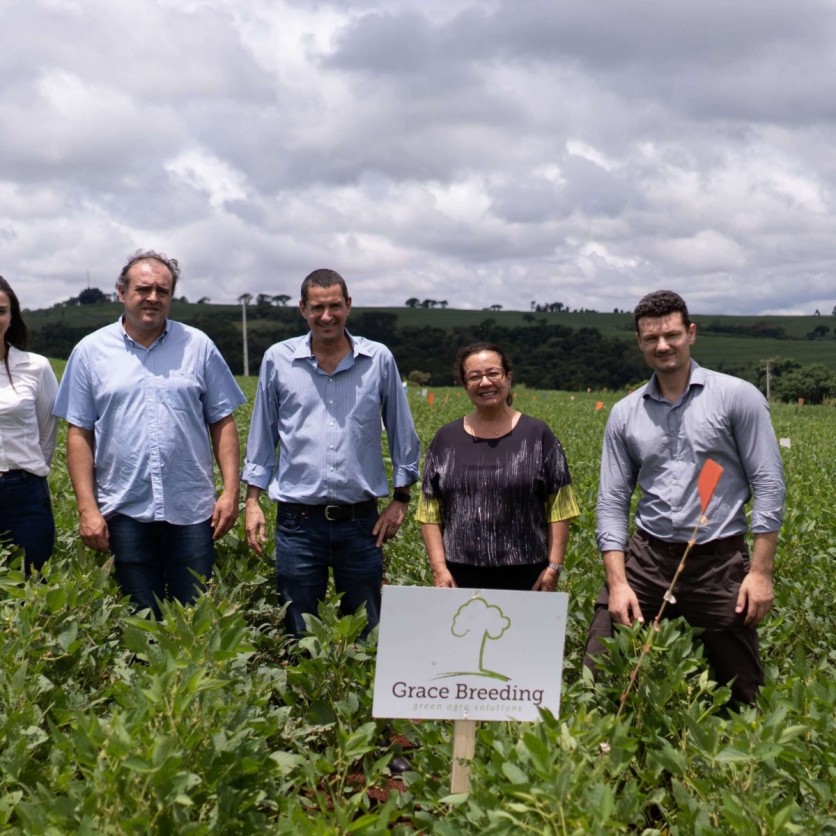Grace Breeding Ltd. (the "Company" or "Grace Breeding") (TASE: GRAC), a forward-thinking AgClimateTech company developing sustainable biological-based products to improve crop yield and vigor, today announces it received the first approval for its NFT Proprietary Bio-fertilizer registration in Brazil, the largest user of bio-based fertilizers and a leading agricultural exporter2. Grace Breeding announced preliminary topline results from this field trial in January and expects complete results to be available this quarter.
In November 2022, Grace Breeding announced a strategic research and development collaboration with University of Londrina (UEL), a prestigious top 10 university in Brazil, based in the Paraná state. The university is investigating Grace Breeding's NFT solution's ability to improve the absorption of nutrients from the soil and increase carbon sequestration and the efficiency of nitrogenous feeding. These attributes would allow farmers to significantly reduce their dependence on synthetic fertilizers. Grace Breeding's ongoing field trials in this region are also supported by Gaia Agrosolutions, also based in Brazil.

READ ALSO : NFT Game 'Polker' is the Next-Generation 'Play to Earn,' According to R&B Singer Akon [VIDEO]
Grace Breeding's NFT allows farmers to significantly reduce their dependence on synthetic fertilizer, or urea, a nitrogen-based fertilizer, that is harmful to the environment, as well as provides them with an alternative that is more economically viable and boosts carbon sequestration. The use of NFT leads to reduced use of urea, and consequently lowers carbon emissions, which is crucial for slowing damage to the environment.
Grace Breeding's NFT combines a natural, non-pathogenic bacteria enabling crops to naturally increase its fertilizer's efficiency, reducing the need for chemical fertilizers. As a result, the process reduces CO2 emissions and leads to a significantly lower environmental impact on soil and the groundwater, while reducing synthetic nitrogen use by up to 50 percent. The global market for chemical nitrogen fertilizers reached a value of over $163.2 billion in 2021, but use of these fertilizers continues to come under great scrutiny with increased regulation due to their environmental impact on soil and groundwater. As a result, sustainable alternatives that are also competitive for crop health are in demand by farmers and distributors. Grace Breeding's NFT can be applied across a wide range of field crops, including corn, wheat, soy, and rice, and can be applied less frequently-once, during sowing, instead of three to four times during the season, which is otherwise the norm.
"We are thrilled to have our first product registration of NFT approved in Brazil, a key market for agricultural staples such as corn and soybean and recently ranked as the number one country in the world in terms of adoption of biofertilizers,1" said Assaf Dotan, CEO of Grace Breeding. "The search for more sustainable technologies for agribusiness has been the focus of studies around the world, and our NFT technology offers a sustainable solution, both to reduce nitrogen use and curb the detrimental effects of urea, as well as increase carbon sequestration and improve corn growth. We look forward to the continued advancement of this program and priming the market in this territory to commercialize this product by year's end."
ⓒ 2026 TECHTIMES.com All rights reserved. Do not reproduce without permission.




